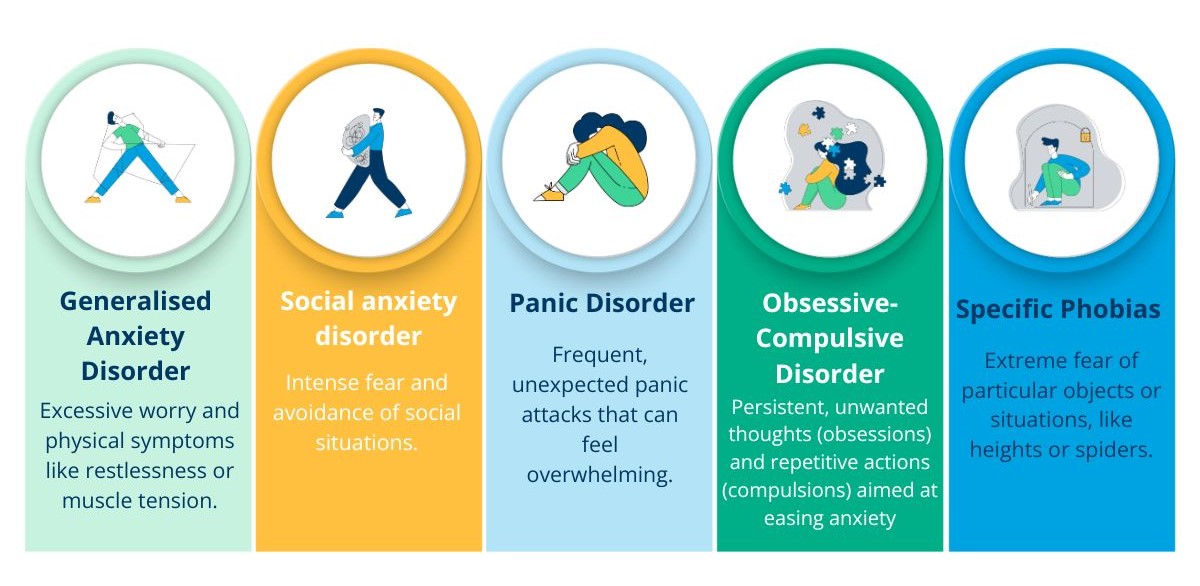Feeling anxious now and then is part of being human. It’s our natural response to stress or danger. But when anxiety becomes persistent and overwhelming, it can disrupt your daily life. Recognising anxiety symptoms is an important step toward finding the right support and learning to manage it. In this blog, we’ll explore the symptoms of anxiety and how you can access support.
What Is Anxiety?
Anxiety is your body’s normal and necessary way of preparing for potential threats – it keeps you alert and ready to act. While this response is helpful in short bursts, it can become a problem when it lingers or intensifies without reason. For some, this can lead to anxiety that feels constant and uncontrollable, meeting the criteria for an anxiety disorder.
Common anxiety symptoms
Anxiety symptoms can present in different ways, and they may differ from one person to another. Here are some common signs you may be experiencing anxiety:
- Excessive worry – Feeling unable to stop worrying about work, relationships, health, or everyday tasks, even when there’s no clear reason to be concerned.
- Restlessness – A constant sense of unease or feeling on edge, often paired with physical tension or fidgeting.
- Fatigue – Regularly feeling tired, even when there’s no physical reason because mental stress can be just as exhausting.
- Irritability – Reacting strongly to small frustrations or becoming easily annoyed.
- Sleep troubles – Struggling to fall asleep, stay asleep, or experience anxiety-fuelled nightmares.
- Muscle tension – Tension or neck, shoulder, or back pain that seems to have no physical cause.
- Upset stomach – Stomach aches, nausea, or digestive issues like diarrhoea are often triggered by stress or worry.
- Panic attacks – Sudden waves of intense fear or anxiety, often with symptoms like a racing heart, shortness of breath, or feeling faint.
- Avoiding social situations – Staying away from social gatherings or situations that make you anxious, can lead to feelings of isolation.
- Perfectionism – Feeling anxious about making mistakes and striving for impossible standards.
- Self-criticism – Engaging in negative self-talk, doubting yourself or replaying past mistakes in your mind.
- Hypervigilance – Being overly alert and always looking for potential dangers, even when none exist.
- Difficulty focusing – Struggling with concentration, decision-making, or remembering things due to an overactive mind.
Types of anxiety disorders
When anxiety symptoms group together in certain ways, they may fit into specific diagnoses. These include:

Seeking help for anxiety with Aim Forward
Anxiety is something many of us experience, but when it becomes overwhelming, it’s important to take it seriously. By recognising the symptoms and reaching out for support, you can take steps towards seeking help and managing anxiety effectively. If you or someone you care about is struggling with anxiety, help is available. You’re not alone, and with the right tools and support, it’s possible to manage anxiety and find peace in your everyday life. Effective treatment options for anxiety include therapy, medication, lifestyle changes and stress management techniques. Mental health professionals can provide guidance, support and tools to manage and reduce anxiety symptoms.
Needs assessments with Aim Forward
Your GP is the first person you should contact if you feel that you are struggling with your mental health (or an emergency service if you are in urgent need of support). If you have already consulted your GP and are being treated but still have trouble at work or when you’re learning, a needs assessment might help bridge that gap.
At Aim Forward, we provide private needs assessments to explore where you currently excel, and where you need more support. During a needs assessment, you will also work with your assessor to create personalised strategies and decide which assistive technologies will most likely work for you.
Find out more about our needs assessments or get in touch to chat with one of our friendly team.


Recent Comments